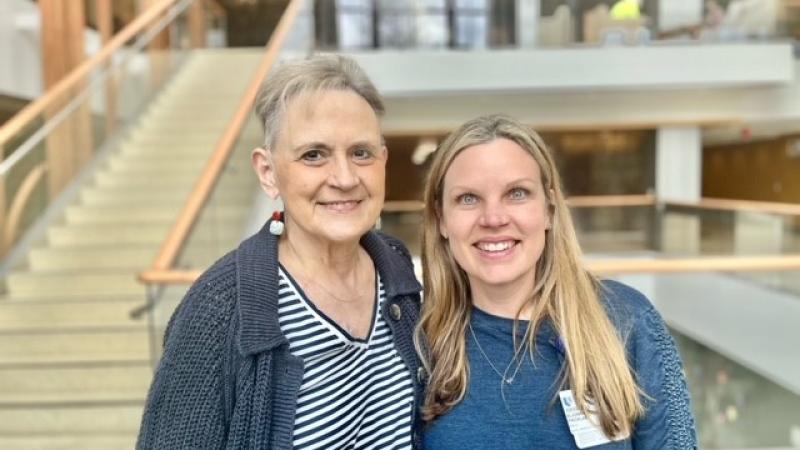
Patient Finds Support Beyond Treatment with Palliative Care
It’s not lost on Sally Weaver that the medical care she receives at Duke Health’s Cancer Center is the reason she’s here today. But if you ask her, the cancer treatments aren’t the primary reason she wants to share her experience. She gives the highest praise for members of her care team – the ones that make her feel that “Duke does it all.”
A Journey Begins at Duke Health
After a period of remission years ago, Sally was diagnosed for the second time with breast cancer. This time, it’s stage 4 and metastatic. The disease is in her bones, and tumors can be found from her skull to her femur. She recalls one of her friends back home in Montana telling her how “if it weren’t for the expert care at Duke, I wouldn’t be here right now,” and continued, “my case is a full-time job in itself!”
Sally explains how her daughter insisted that she be seen at Duke while visiting North Carolina:
“My daughter lives in Durham. In addition, Dr. Kimmick was her medical oncologist when she had breast cancer a couple years ago. I live in a small town in Montana and while we have a good regional cancer center and I have great respect for the oncologists there, it quickly became clear that my situation was going to require the expertise available at a major cancer center. I also think that Duke's role as a teaching hospital has a very positive effect on the perspective and collaboration of the treatment team. I am so grateful to have access to the level of care – and kindness – that I have experienced at Duke. There is also an appropriate touch of humor and hugs which I fully welcome.”
A lawyer by trade and former Dean of University of Montana School of Law, Sally knows the importance of truly getting to know people. To her, it’s that same connection that makes Duke so special. Sally is deeply appreciative of the strong relationship she has with her entire care team – in both oncology and palliative care. She recognizes how all of her providers work with each another in an uplifting way, and she’s convinced that it directly impacts the way she is treated as a patient. The team’s mutual collaboration, respect, and genuine trust, both within and outside the department, is something she’s never experienced as a patient prior to coming to Duke.
A Top Notch, Collaborative Team
Sally explains that palliative and hospice care are very scary to many cancer patients, who see both as end-of-life comfort care. “Many often do not understand the scope and efficacy of palliative care and we fail to ask the questions we should ask or access the resources that are available as part of palliative care,” she says.
Sally’s palliative care team includes a physician’s assistant (PA), social worker (LCSW), physical therapist, and nutritionist. They have all exceeded her expectations with their regular communications, in person and at home care, as well as their overall connection with her. One example of this occurred when Sally was immediately referred to an oncology radiologist for treatment after reporting continuous pain that limited her movement because of the large tumors. There was also a time when she was experiencing alarming weight loss and the palliative care nutritionist created a tailored plan and guided Sally to maintain a safe weight to continue her cancer treatment.
In fact, Sally knows that she can call her palliative care provider, Betsy Fricklas, PA, with any concern and can trust that she will find the answer or set up an appointment with the right person. “Betsy and her team are there for the in-between. My pain has diminished, and my mobility has improved. Also important is the holistic approach that has reduced my anxiety and allowed me to sleep at night. Pain is not an acceptable end result of this team, and they bring their collaborative knowledge and perspective to solving that problem. Thanks be to the goddesses for that!”
Duke’s Palliative Care Team
Duke Palliative Care is committed to their patients’ best possible quality of life by focusing on their physical, emotional, and psychological strength. To accomplish this, they continuously collaborate directly with patients and their care team to navigate the best options at any age or stage of illness. Duke’s palliative care team proudly partners with each other as well as patient providers to address any concerns including relief from the pain, symptoms, and stress of serious illness. Learn more about Duke Health’s palliative care program online.
Palliative Care Supports Both Patients & Loved Ones
“We all acknowledge and accept that there is no ‘cure’ for my case, but the Duke team has been very focused on improving my quality of life,” says Sally. "Every morning I have to decide whether I am going to focus on how to live my life or how to approach the end of my life. That makes it difficult to plan my day."
"The palliative care team is gently but clearly supporting me through this process which makes a huge difference for me and for my family. In fact, the first thing my daughter asks when I have a meltdown is ‘Mother, when is your next appointment with the LCSW or others from the palliative care team?’ We all recognize how hard this is and we all acknowledge that we lack the skills and the perspective to address hard questions in ways that are helpful. That is where the Duke palliative care team provides invaluable support.”